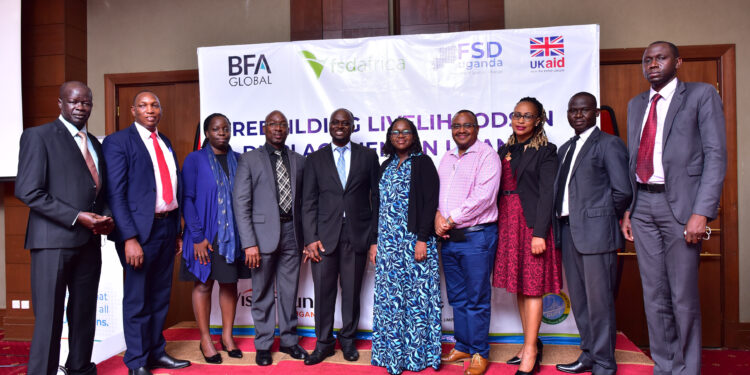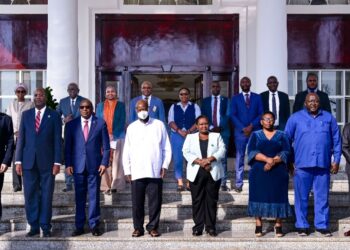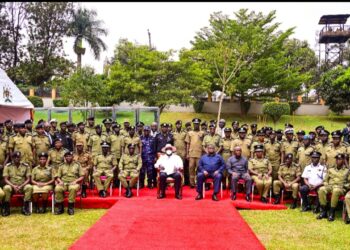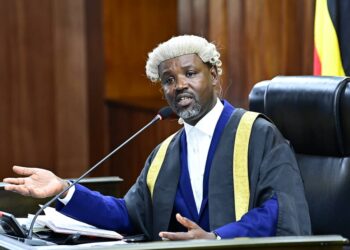The Government of Uganda through the Office of the Prime Minister has welcomed the report by Financial Sector Deepening (FSD) Uganda and Africa in partnership with Bankable Frontier Associates which revealed that refugees still prefer keeping their cash at home despite an increase in mobile banking services usage.
While speaking during the launch of the report at Sheraton Hotel Kampala on Tuesday, Nelson Balyeku, the Head of monitoring and evaluation in the department of refugees, Office of the Prime Minister said the new findings are acting as an eye-opener to the government on how refugee camps can be helped as far as financial inclusion is concerned.
He added that the government has been having data gaps on how refugees handle their financial issues but the new report has outlined them clearly.
“We shall organize a virtual forum for FSD and all the partners for them to disseminate this very important information to the OPM field colleagues together with local governments of the host communities. We don’t want this report simply to be put in the drawers. The data we have is old, now this report has the most recent data and we must use it and the recommendations in the report will be highly taken into consideration. But also we shall use the data in different aspects,” said Mr Balyeku who represented Commissioner for Refugees in the Office of the Prime Minister Douglas Asiimwe.
The report dubbed, ‘Rebuilding Livelihoods in Displacement’, further revealed that while refugees have a wide range of income sources, self-employment remains one of the primary sources of income. However, proceeds from agriculture are on the rise with more people paying attention to the sector because of reduced food rations.
David Darkwa, Manager Competitive Strategies, FSD Uganda, said: “The two-year FI4R intervention has validated the effectiveness of key business approaches such as agency banking and digitized VSLAs in addressing the identity, distribution, and marketing challenges faced by financial service providers who wish to serve the forcibly displaced community. We expect this seminal project to facilitate a coordinated entry of more actors into this space over the next few years.”
Kuria Wanjau, Manager, Forcibly Displaced People, FSD Africa, disclosed the research on refugees’ financial lives and their uptake of different financial products have proven they are a viable and bankable segment. And they look forward to seeing stakeholders in the financial and humanitarian ecosystem applying the insights provided to help displaced communities rebuild their lives
“I am proud to note the efforts of various partners who are introducing customized products and adding extra features to existing products to formalise financial systems in the refugee settlements. Through enhanced collaborations, I do not doubt that these will scale to impact more populations in these areas.”
In their joint communication, FSD Africa, FSD Uganda, and BFA Global recommended an urgent need to improve access to formal financial services because agency banking was found to be low which limited the use of formal financial services. Most agents are stationed at the administrative centre which is far from some of the refugees.
They also recommended the development and refinement of financial products to cater to the needs of refugees. These could include branchless banking to make financial services more accessible and microinsurance for medical emergencies.
Additionally, they recommended renewable energy solutions for lighting and cooking and upskilling for economic self-sufficiency.
Some of the findings from the research include:
Finance: There is the dominance of community organised savings and credit approaches through Rotating Savings and Credit Associations, and Accumulating Savings and Credit Associations. Households cut back their contributions to these groups during the COVID-19 pandemic due to reduced income. However, contributions have started to pick up now, especially since refugees need access to credit due to reduced food rations and cash-based transfers.
Income and livelihoods: Refugees in Uganda have a wide range of income sources. Several of the respondents relied on more than two income sources. The number of respondents that were engaged in some type of self-employment was 56 per cent. This ranged from tailoring and selling vegetables to running restaurants, bars, or wholesale businesses. Just under half of the respondents (41 per cent) depended on agricultural income, 28 per cent were casually employed and 7 per cent had regular employment.
Mobile phone usage: There has been an increase in the number of refugees owning or having access to mobile phones with mobile phone usage among female refugees increasing by 10 per cent since 2019. This is largely because of recent changes in legislation for SIM registration in Uganda which allows refugees to buy and register SIM cards in their names. Mobile money usage has also increased by 32 per cent. The rise can further be attributed to the Covid 19 pandemic which drove the preference for digital means.
Health: The majority of refugees kept money at home to cater for medical emergencies and for buying medication. Just over half, (55 per cent) of the respondents purchased medication out of pocket.
By mapping the financial lives of refugees, the research aims to inform the financial services sector of the impact of financial services on refugee livelihoods in Uganda and highlight wider implications for related ecosystems.
Do you have a story in your community or an opinion to share with us: Email us at editorial@watchdoguganda.com













